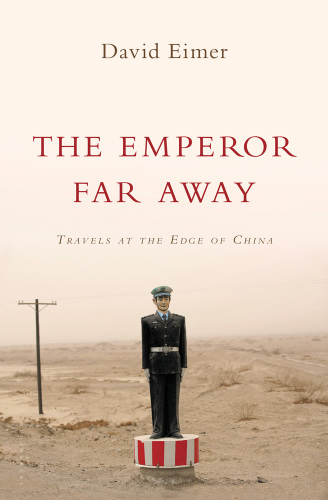
The Emperor Far Away
Travels at the Edge of China
کتاب های مرتبط
- اطلاعات
- نقد و بررسی
- دیدگاه کاربران
نقد و بررسی

May 19, 2014
An ancient saying, “The mountains are high and the emperor is far away,” lends this engaging travelogue its title as Eimer, Beijing correspondent for the U.K.’s Sunday Telegraph, takes readers to China’s border regions. He begins in the far western Xinjiang province, home to the bulk of China’s restive Uighur population, with whom he mingles and commiserates amid waves of Han migration and state repression. Next, Eimer explores Tibet, demystifying standard Western images of its people, while contextualizing their struggles with Chinese domination and encroachment. Part three moves into Yunnan, as Eimer mingles with the Dai and other “model minorities” along China’s massive, porous, and fairly lawless border with the regions of Southeast Asia. Finally, Eimer scouts the three provinces of Dongbei, along China’s northeast border with North Korea and Russia’s Far East—an area China is poised to exploit, if not in a territorial grab then via economic colonization. Narrated by this curious Englishman and peopled by a cast of natives, settlers, tourists, and ex-pats, this absorbing book is a tantalizing introduction to China’s diversity and the ethnic and political dynamics at the extremes of its empire. Channeling wanderlust while limning the challenges for both pan-border minorities and global powers in these historic, strategic, and resource-rich lands, Eimer’s detailed survey of minority China should interest travel junkies and students of ethnography and geopolitics. Agent: Ben Mason, Fox Mason Ltd. (U.K.).

June 1, 2014
A history/travelogue of the far-reaching Chinese frontiers that share more with the cultures of central Asia than with the Han majority.Xinjiang, Tibet, Yunnan, Dongbei: These are the border regions of China that contain its 55 officially recognized ethnic minorities (about 100 million people) yet are increasingly being populated and overruled by the Han. Sunday Telegraph Beijing correspondent Eimer synthesizes his trips into these nether regions since the 1980s, when he first ventured to Xinjiang, the region of the Muslim Uighurs in the far west, bordering Kyrgyzstan, Kazakhstan and Mongolia, among other countries. The journey west across the ancient Silk Road still takes days on a train, but there are many more Han moving westward in what the author sees as a new "colonizing" fever. They have not been particularly welcome among the natives, who often don't even speak Chinese and "regard the Han as interlopers." Indeed, there continue to be spontaneous uprisings against them, and the Uighurs and other minorities largely keep a wary distance from the Han, and vice versa-unlike the more harmonious mixing of ethnic groups in nearby Kazakhstan. From Kashgar, Eimer moved south through the Silk Road stops of Yarkant and Hotan, where he sensed strongly the Chinese Communist Party's strenuous efforts to suppress the Uighurs' religious expression. Then he traveled into mountainous, exotic Tibet, where simply possessing a picture of the Dalai Lama can lead to arrest and Buddhists pilgrims continue to flock despite severe CCP repression. In the deep south of Yunnan Province, heart of the Golden Triangle, the author traveled along the porous, jungle borders of Myanmar and Laos. Eimer also explored Dongbei, which makes up the northeast border near Mongolia, Russia and North Korea and contains many Koreans and Manchus of all stripes (even Christian).A swift-moving, colorful account of the bewildering array of fiercely independent ethnic groups within an uneasy Chinese "home."
COPYRIGHT(2014) Kirkus Reviews, ALL RIGHTS RESERVED.

Starred review from May 1, 2014
China borders on 14 countries, which makes it more like a continent than a country, and as a Chinese adage says, the mountains are high and the emperor is far away--meaning that Beijing's control over many of its most remote areas is relatively weak. In order to see for himself just how accurate these concepts are, Eimer, who has lived in China for five years and writes for England's Daily Telegraph, embarked on a journey to China's four border regions. The book is divided into four parts: "Xinjiang--The New Frontier"; "Tibet--The Wild West"; "Yunnan--Trouble in Paradise," and "Dongbei--Pushing the Boundaries." Eimer traveled, ate, lodged, and spent considerable time with the people he met en route. Here he shares his observations and experiences in an engaging and entertaining manner. For example, in southern Xinjiang, "medicine men stand on the back of their carts, armed with a microphone, extolling the virtues of herbal cures and aging pharmaceutical products." On the Korean border where Eimer met Christina, his translator, she said, "'From your voice and emails I thought you were younger.' No one in China is ever shy about comments on the age or looks of a foreigner." VERDICT A superlative choice for either casual interest or a more in-depth look at modern China.--Susan G. Baird, formerly with Oak Lawn P.L., IL
Copyright 2014 Library Journal, LLC Used with permission.

























دیدگاه کاربران